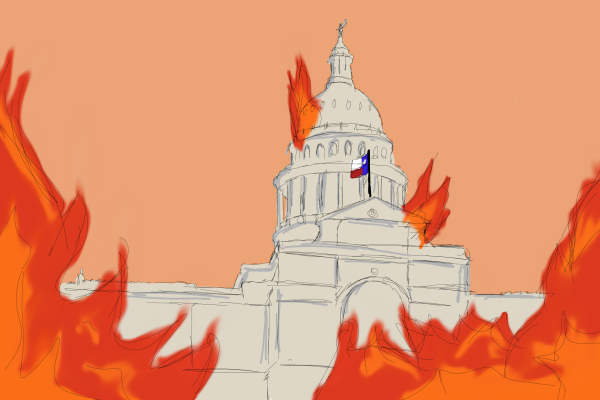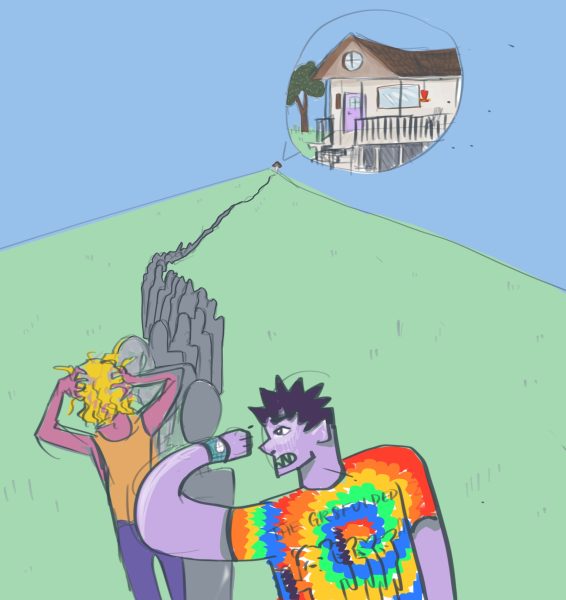Guest Column: A chance to rescue our future
Ethan Crane is a senior philosophy major and economics minor and the outgoing outreach chair for Eco Allies.
Guest columnist Ethan Crane
Last week, our student body’s representative government officially called on Trinity to divest its endowment from fossil fuels. The Student Government Association (SGA) resolution to divest is a historic and vital response to the most pressing crisis of our time. It formally legitimizes the demands of Divest Trinity — outlined in the petition we wrote two years ago — and on its own, the resolution is a meaningful expression of solidarity with the frontline communities who are assaulted and violated by climate disaster. Already, the climate crisis is greatly exacerbating food insecurity, human displacement and animal death. On our current trajectory of carbon emissions, utterly catastrophic events will become much more likely: global food production shocks, inundated low-lying islands and coastal regions, and mass extinction. Meanwhile, fossil fuel companies continue to lie to the general public about their actions, shifting from absurd climate denial to greenwashing as they increasingly ravage the planet we all depend on. Our resolution signals to society that these companies have morally illegitimate business models and that it is necessary for Trinity’s Board of Trustees to acknowledge this immediately.
It can’t be overstated how serious the climate crisis is, and so it demands rigorous action from all of us in response. By funding fossil fuels, we make ourselves morally complicit in fossil fuel companies’ Earth-destroying agenda. We transgress the marginalized beings who bear no responsibility for this crisis. We abet abuse at an unparalleled ecological scale, and thereby commit a grave injustice.
The world’s most respected body of climate scientists, the Intergovernmental Panel on Climate Change, or IPCC, has concluded that we must peak carbon emissions by 2025, cut emissions in about a half by 2030, and reach net zero emissions by 2050 if we want any chance of averting irreversible and cascading climate impacts. The IPCC recently stated that it is necessary to start abandoning existing and planned fossil fuel infrastructure to meet these targets. So, how are fossil fuel companies responding? Exxon plans to increase its carbon emissions 17% by 2025, as it flaunts the unscalable and insufficient solution to capture carbon from the atmosphere and store it underground. Altogether, oil and gas production is projected to increase until at least 2040. Thus, we reach the unavoidable conclusion that we are doing nowhere near enough to keep our planet habitable for us all and that fossil fuel companies must be phased out of existence.
The main response to the divestment resolution has been to ask: can Trinity divest from fossil fuel companies without harming its student body? The answer is yes. Trinity is quite capable of pulling assets out of fossil fuels without reducing the size of its endowment. Analyses point to divested portfolios performing no worse than fossil fuel portfolios, and since the price of fossil fuel shares will likely drop precipitously as renewables advance or as the regulation of fossil fuels tightens, it would be financially safe for Trinity to divest. However, a better way to frame this question is to ask: can Trinity invest in fossil fuel companies without harming its student body? The answer is no. Our futures are severely limited by a devastated environment, whether or not we are the victims of climate disasters. Climate change threatens cultural heritage and it greatly inhibits our personal autonomy. For example, many future Trinity students will be motivated to spend more of their time studying something as dreadful as climate change rather than learn their ancestors’ language or explore and enjoy the living world. You might find this trivial, but for many of us, climate change is associated with anxiety, helplessness, and despair as all that we value risks withering away for good.
It’s important that we recognize that the climate crisis doesn’t have to be perceived as a burden. It’s an opportunity to leave a flourishing planet for generations to come. It’s an opportunity to free ourselves from needless work and ensure that everyone has a decent standard of living. It’s also our opportunity to make Trinity a more inclusive community. If the Board of Trustees wishes to make do on its commitment to intentional inclusion, then it must listen to the overwhelming evidence presented by its student body that climate action needs to happen here and now.
Now is a unique opportunity for you, reader, to help move our world to climate stability and justice. To show even more widespread student support for divestment, clubs are signing on to a public statement in support of the resolution. The African Student Association, Chinese Culture and Language Club, TU Pro Choice, Muslim Student Association, and International Club are the first to join Eco Allies in calling for divestment. Assuming it is within the purview of your club’s mission statement, bring it to your club’s attention and hold a vote to sign on. Fill out this form once you’ve secured your club’s support or you need help securing their support. Want to get involved more directly? Email me at [email protected] and I will connect you with Eco Allies and our Divest Trinity subcommittee.
We don’t have the luxury to wait. Our present actions in response to climate change shape the world for centuries. Ask yourself this: If you knew that your loved ones would be victims of some future climate disaster, should it strike, what would you sacrifice now to keep them safe?











Marty Rashoff • May 5, 2022 at 11:40 pm
Agree 100%